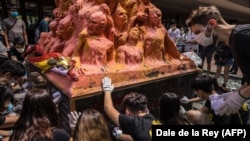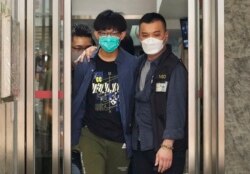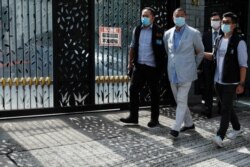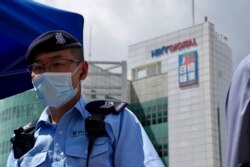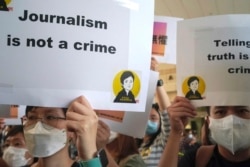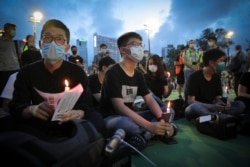On January 20, the European Parliament adopted a resolution “on violations of fundamental freedoms in Hong Kong.”
In a press release, the European Parliament said it “condemns in the strongest terms the deterioration of human rights in Hong Kong, including severe restrictions on freedom of expression, freedom of association and press freedom.”
European Parliament members demanded the release of political prisoners and a halt to criminal proceedings against “peaceful protesters arrested in recent years.”
The parliamentarians also called for China to repeal Hong Kong’s National Security Law (NSL), which was passed on June 30, 2020, following the 2019–2020 Hong Kong pro-democracy protests.
The European Parliament said the NSL breaches China’s “international commitments and obligations.”
Hong Kong authorities disagree. On February 18, the Commissioner of the Ministry of Foreign Affairs in Hong Kong “firmly” rejected the European Parliament’s report.
The report, a spokesperson said, “slandered the Chinese government's policies towards Hong Kong and clamored for sanctions and intervention activities.”
“The spokesperson said the National Security Law in Hong Kong targets only a small group of criminals engaged in activities endangering national security, and Hong Kong residents enjoy a wide range of democratic rights and freedoms under the law,” China’s state-run Xinhua news agency reported.
That is false.
In fact, as the European Parliament and others have reported, the NSL has been used to clamp down on democratic rights previously enjoyed in Hong Kong, undermining its de facto constitution.
Hong Kong has been governed under the so-called “One Country, Two Systems” principle since the end of British colonial rule in 1997.
Although “One Country, Two Systems” recognizes Hong Kong as a part of China, it allows – at least in theory – Hong Kong to maintain its own systems of law, governance, economy and finance.
China established Hong Kong as a Special Administrative Region (SAR) in 1997, in line with Article 31 of China’s constitution.
Under this arrangement, China accepted the drafting and adoption of Hong Kong’s Basic Law, sometimes referred to as a mini-constitution.
Chapter 1, Article 5 of the Hong Kong Basic Law states: “The socialist system [of China] and policies shall not be practiced in the Hong Kong Special Administrative Region, and the previous capitalist system and way of life shall remain unchanged for 50 years.”
By contrast, the NSL criminalizes four categories of activities – secession, subversion of state power, terrorism and collusion with foreign entities. The law also gives authorities in Hong Kong and Beijing wide latitude to control the internet, media outlets, schools and other groups.
The U.K.-based rights group Amnesty International called the NSL “dangerously vague and broad,” warning “virtually anything could be deemed a threat to ‘national security’ under its provisions.”
China also claims the NSL has authority over anyone anywhere in the world.
A number of legal analysts say the NSL violates Hong Kong’s Basic Law.
In a piece published on February 17 by JURIST, a law school-based legal news and commentary service, Nandini Dwivedi argued that certain aspects of the NSL might be unconstitutional, as it potentially changes the Basic Law.
She wrote that the NSL might be justified on some grounds, specifically its stated policy of “upholding national unity and territorial integrity.”
Referring to the Sino-British Joint Declaration, which laid the groundwork for Beijing to regain sovereignty over Hong Kong, Dwivedi noted that policies from the declaration are “incorporated in various provisions of the Basic Law”:
“[P]aragraph 3 of the Joint Declaration also provides among other things that 'right and freedoms, including those of the person, of speech, of the press, of assembly, of association, of travel, of movement, of correspondence, of strike, of choice of occupation, of academic research and of religious belief will be ensured by law.'
“As we know, the NSL has deteriorated many of these rights. It also infringes upon Hong Kong’s high degree of autonomy and independence of judiciary. The NSL in a sense amends the basic structure of the Basic Law and is thus incompatible with Article 159 (4) of the Basic Law.”
In a piece published in February 2021 by Georgetown University's Center for Asian Law, Lydia Wong and Thomas Kellogg say the NSL “infringes on the autonomy of Hong Kong’s core political and legal institutions.”
They wrote that the NSL’s provisions can be used “to punish the peaceful exercise of core political rights, in potential violation of both the Basic Law and the obligation of the Hong Kong government to adhere to the International Covenant on Civil and Political Rights (ICCPR).”
The ICCPR, a multilateral treaty overseen by the United Nations Human Rights Committee, commits states to safeguarding a number of core civil and political rights. They include the right to life, due process, freedom of assembly, expression, thought, conscience and religion.
China is a signatory to the convention but has not ratified it.
Wong and Kellogg cited several cases, including that of media tycoon Jimmy Lai, founder of the popular Apple Daily newspaper and the first high-profile person charged under the NSL.
In December 2021, he was imprisoned for 13 months for allegedly inciting people to take part in a June 2020 vigil to mark the 1989 Tiananmen massacre in Beijing. Hong Kong authorities charged more than two dozen other politicians and activists in connection with that vigil.
In June 2021, Lai’s Apple Daily announced it was closing after being raided by security forces, who arrested senior executives. Police froze the assets of companies linked to the paper. Hong Kong authorities allege Apple Daily’s reporting violated the NSL.
The Washington, D.C., nonpartisan advocacy group Freedom House called the national security arrests and closure of the Apple Daily “the lowest point for press freedom in the territory in recent memory.”
Freedom House also noted the government takeover of Radio Television Hong Kong (RTHK), which, it said, has “turned into a propaganda outlet.”
Freedom House noted that Hong Kong’s pro-Beijing chief executive, Carrie Lam, announced that RTHK would partner with state-owned China Media Group to broadcast programming to “nurture a stronger sense of patriotism.”
Lam hosts her own daily show on RTHK.
Wong and Kellogg observed that Lai and other pro-democracy figures in Hong Kong were potentially being punished for exercising fundamental “rights to expression, association, and assembly,” which are protected under the Basic Law.
In its resolution, the European Parliament noted that following the arrest of 139 people under the NSL between July 1, 2020, and December 31, 2021, 94 people had been formally charged by the end of last year.
Authorities put 60 of those people in pretrial detention. The European Parliament said this shows that “peaceful political expression has been disproportionately restricted and even criminalized under the NSL.”
The European Parliament argued that “the NSL flagrantly violates the 'One Country, Two Systems' principle and the Sino-British Joint Declaration,” noting that Hong Kong authorities “used the annual Tiananmen candlelight vigil the group had been organizing for 30 years as evidence of ‘endangering national security.’”
The parliament called on the Hong Kong government to release political prisoners and others arrested and charged in recent years for exercising “their right to freedom of expression or other human rights.”
Among those arrested was Joshua Wong, imprisoned on charges related to pro-democracy protests and the unsanctioned Tiananmen massacre vigil; and Margaret Ng, a member of the pro-democracy party who was sentenced alongside nine others for organizing and participating in an August 18, 2019, protest.
Beyond the Basic Law, the European Parliament also said that “Hong Kong is bound by the International Covenant on Civil and Political Rights and has a legal obligation to respect the rights to freedom of information, expression and association, as well as to guarantee due process.”
Freedom House also argued that the NSL “effectively ended Hong Kong’s autonomy and has infringed on human rights guaranteed under Hong Kong’s Basic Law and international human rights laws in force in Hong Kong.”
Freedom House said that “an emboldened Beijing has demonstrated it will continue to crackdown on Hong Kong until there is no opposition left,” adding: “Hong Kongers are now living in a high-risk territory where they could face potential life in prison for exercising their human rights.”




